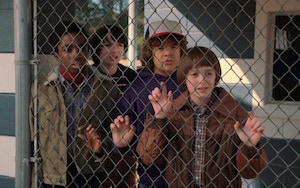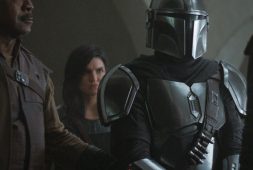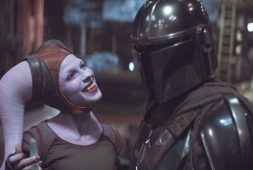
Who am I? Who hasn’t asked this deep philosophical question at some point in their life? I remember at the age of twelve staring into my bedroom mirror and for the first time truly gazing into my soul and realizing my own mortality and distinctiveness. Who was this girl? Did I like who she was? Did I represent something special? What defined me or made my life significant? Was I defined by those around me – classmates, family, friends? Or did I define myself? And what did that mean? And while I didn’t yet know Jesus, I knew that there was some answer waiting to these deep soul-level questions.
Among many other ideas that surfaced in episode one, season two of Stranger Things, the show’s creators, the Duffer brothers, address the issue of identity on many levels. What is it that defines people? What makes them special?
The very title of the episode, “Madmax,” gives a little indication into the issue of identity. After scrounging for loose change, we find the reunion of our four boys at the Palace, a video gaming hangout, as they crowd around 80’s video games in an effort to maintain or beat their high scores. But low and behold, Dig Dug has a new grand champion – Madmax. The boys are dumbfounded and race to try and discover this new threat – only to find that it is a girl (and a new classmate to boot). Maxine is her name, but she boldly tells her teacher that her name is “Max” before she sits down at the back of the class. We see her character throughout the show – riding to school with her rebellious brother blasting the Scorpions from his Firebird, skateboarding, leaving notes in the garbage can for her “creep” fans, and slamming the door to her brother’s car as she heads into the Palace for another round of video games. But what is clear is that this “Madmax” knows who she is and isn’t going to take any guff for being true to herself. And of course, a new love interest is born for Dustin and Lucas.
In another scene, Will faces anonymous bullies when he finds a mean note in his locker with the label Zombie Boy on it. We also are introduced to the notion of “post traumatic stress disorder” as Will goes to counseling appointments following an apocalyptic vision he had while at the Palace earlier with his friends. After finding the note, however, Will heads home and sits on his bed where he begins to sketch his comic alter ego. When his brother Jonathan walks in with a selection of movies for family movie night, he sits down beside Will and asks what he is working on. Looking over Will’s shoulder at the sketch he is drawing, the following discussion takes place:
Jonathan:
-
- Zombie Boy. Who’s Zombie Boy?
Will:
-
- Me.
Jonathan:
-
- Did someone call you that? Hey. You can talk to me. You know that, right? Whatever happened. Will, come on, talk to me.
Will:
-
- Stop treating me like that.
Jonathan:
-
- What? Like what?
Will:
-
- Like everyone else does. Like there’s something wrong with me.
Jonathan:
-
- What are you talking about?
Will:
-
- Mom, Dustin, Lucas… Everyone! They all treat me like I’m going to break. Like I’m a baby. Like I can’t handle things on my own. It doesn’t help. It just makes me feel like more of a freak.
Jonathan:
-
- You’re not a freak.
Will:
-
- Yeah, I am. I am.
Jonathan:
-
- You know what? You’re right. You are a freak.
Will:
-
- What?
Jonathan:
-
- No, I’m serious. You’re a freak. But what? Do you wanna be normal? Do you wanna be just like everyone else? Being a freak is the best alright. I’m a freak.
Will:
-
- Is that why you don’t have any friends?
Jonathan:
-
- I have friends, Will.
Will:
-
- Then why are you always hanging out with me?
Jonathan:
-
- Because you’re my best friend, alright? And I would rather be best friends with Zombie Boy than with a boring nobody. You know what I mean? Okay, look. Who would you rather be friends with? Bowie or Kenny Rogers?
Will:
-
- Ugh [turns away with a shake of his head]
Jonathan:
-
- Exactly. It’s no contest. The thing is, nobody normal ever accomplished anything meaningful in this world. You got it?
Will:
-
- Well…some people like Kenny Rogers
Enter mom’s new boyfriend Bob played by Sean Astin (remember Rudy, Mikey from the Goonies and Samwise Gamgee from the Lord of the Rings trilogy) – “Kenny Rogers. I love Kenny Rogers.” Both boys chuckle – and we do right along with them. [end scene]
What is it about this brotherly chat that resonates with us? Who hasn’t felt like an outcast at some point in their life? And if they haven’t, they’ve definitely witnessed others dealing with feelings of anxiety, loneliness, frustration, anger and fear. Of course, Will has some PTSD that is thrown into the equation (or perhaps some evil reality that remains to be unveiled). Regardless, he is feeling like a freak, and instead of being persuaded otherwise, his brother Jonathan validates his “freakiness” or “geekiness” in a way that only brothers can. He comes alongside him and relates to him as a fellow “freak” pointing out that freaks are often much more interesting and even impactful to the world (in a funny comparison of Bowie and Kenny Rogers).
While I may not agree with the conclusion that Jonathan draws when he says that “nobody normal ever accomplished anything meaningful in this world,” I do appreciate the idea that being true to who we are is important. Finding our identity is important. Not accepting the labels of others as the end all be all is a necessary realization as we mature and discover who we are. Like the twelve-year-old young girl looking into the mirror and wondering who she was, life can get complicated when we start wondering who we are and can’t seem to find a good answer. But, consider Paul’s words in Colossians 2:6-10:
6 So then, just as you received Christ Jesus as Lord, continue to live your lives in him,
7 rooted and built up in him, strengthened in the faith as you were taught, and overflowing with thankfulness.
8 See to it that no one takes you captive through hollow and deceptive philosophy, which depends on human tradition and the elemental spiritual forces of this world rather than on Christ.
9 For in Christ all the fullness of the Deity lives in bodily form,
10 and in Christ you have been brought to fullness. He is the head over every power and authority.
In other words, we have an identity that has been sealed for us in the person of Jesus and every worldly negative label nailed to the cross. In Christ, we all can embrace this new identity as we live out our lives. Jesus exemplifies compassion, integrity, truth, goodness and servanthood. And He calls us to take up our identity in Him – literally to pick up our crosses daily and follow Him (in His steps). Though the world may call us names or drop mean notes in our lockers (or mean comments on Insta), our identity is unchanged. We are followers of Jesus. He loved the world and gave Himself for the world – we are called to the same. We may at times feel like freaks, geeks, wasteoids, nerds or any of the other sundry labels that the world may give us– but beneath and beyond all of those labels, we are Christians. And that is an identity that we can claim for eternity.
Questions:
- What are some labels that are given to kids nowadays? What are the worst ones? What are the best ones? Do we tend to label others around us? Is this helpful or hurtful?
- If you could claim any label for yourself, what would it be? Why? Do others see you this way? Is it helpful or hurtful?
- How do you think Jesus sees you? Does He label you?
- Should labels that are given to us or others around us define who we are? Why or why not?
- What do you think Paul meant in the book of Colossians in the Bible when he said, “See to it that no one takes you captive through hollow and deceptive philosophy, which depends on human tradition and the elemental spiritual forces of this world rather than on Christ”? Where are some places you might hear some of these “hollow and deceptive philosophies” today?
- Do you agree with the advice Jonathan gave Will when he said, “nobody normal ever accomplished anything meaningful in this world”? Why or why not?
- Interestingly, Will says “some people like Kenny Rogers” just before their mom’s new boyfriend Bob (Sean Astin) enters the room and says that he loves Kenny Rogers. Is the audience meant to dislike Bob? To feel sorry for him? To view him as simple minded? If so, is this how Jesus wants us to view others?
- How does having an identity in Christ differ from having labels such as geek, freak, wasteoid, etc.? Can anyone have an identity in Christ?
- How does Jesus want to change the way you view others? How will you respond this week?
Written by Amy McKee
Jonathan McKee
Jonathan McKee is the author of over twenty books including the brand new The Guy's Guide to FOUR BATTLES Every Young Man Must Face; The Teen’s Guide to Social Media & Mobile Devices; If I Had a Parenting Do Over; and the Amazon Best Seller - The Guy's Guide to God, Girls and the Phone in Your Pocket. He speaks to parents and leaders worldwide, all while providing free resources for parents on his website TheSource4Parents.com. Jonathan, his wife Lori, and their three kids live in California.



